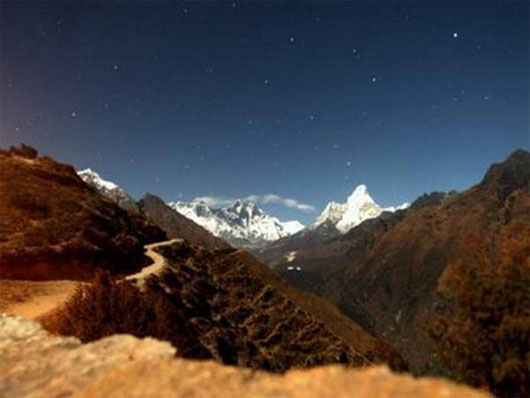2100: The Himalayas may lose 45% of the ice
In a recent report, the Intergovernmental Committee on Against Climate Change (IPCC), issued a more cautious new forecast regarding the possibility of melting ice in the Himalayas, accordingly, from now until 2100. , this majestic mountain range is at risk of losing up to 45% of the ice if the average temperature of the Earth's surface increases by 1.8 degrees Celsius, nearly touching a safe level of 2 degrees Celsius.
>>>Antarctic glaciers are melting faster
In the report entitled 'The Fifth Assessment Report on the Impact of Climate Change 2014' , IPCC relied on 14 computer simulation images to produce two forecasts.
First, the Himalayas will lose 45% of the ice on average 1.8 degrees Celsius. Secondly, with an increase of 3.7 degrees Celsius, melting ice will increase to 68%.
Both of these forecasts get benchmarked since 2006.

Himalayan glaciers melt quickly under the influence of climate change.(Photo: AFP)
Earlier, in the fourth report published in 2007, the IPCC once made a false prediction that ice in the Himalayas would completely dissolve by 2035.
In the 2007 report, the IPCC also made another misconception when it was assumed that up to 55% of the Netherlands would be under the sea, instead of 26%. This organization also admitted this error in 2010.
The IPCC leader, Rajendra Pachauri, acknowledged a serious mistake in the 2007 report, which helped the group and then US Vice President Al Gore (An Go) receive the Nobel Prize for peace.
According to IPCC experts, the forecasts are more reliable because of a study published in 2013.
Also in 2014, UN Secretary-General Ban Ki-moon promoted an investigation by a group of scientists from 15 countries to affirm the above IPCC mistakes without losing credibility. Overall trust of this organization.
However, IPCC is also recommended to strengthen methods of working to meet the requirements of assessing increasingly complex climate change.
IPCC was established in 1988, responsible for assessing the risks associated with climate change caused by human activity.
One of the IPCC's main activities is to publish special reports on climate change related topics.
Earlier, the IPCC 2007 report helped promote a series of positive actions and brought hope to a global treaty against climate change.
However, the UN Conference on Climate Change in Copenhagen, Denmark in 2009 failed to achieve this goal due to disagreements over the issue of greenhouse gas emissions reductions between industrialized and developing countries. .
- Survive after 47 missing days in the Himalayas
- UFO in the Himalayas in secret CIA documents
- The mystery of the rise of the Himalayas
- Fish know to walk in the Himalayas
- Lose weight ... avatar
- Glaciers in the Himalayas are melting
- 'Footprints of snowmen in the Himalayas'
- The most beautiful airport on the world roof
- The existence of glaciers in the Himalayas
- The life of no money, no technology of tribes in the Himalayas
- Birds conquer the Himalayas
- The tree conquers harsh cold on the Himalayan peak
 Is the magnetic North Pole shift dangerous to humanity?
Is the magnetic North Pole shift dangerous to humanity? Washington legalizes the recycling of human bodies into fertilizer
Washington legalizes the recycling of human bodies into fertilizer Lightning stone - the mysterious guest
Lightning stone - the mysterious guest Stunned by the mysterious sunset, strange appearance
Stunned by the mysterious sunset, strange appearance